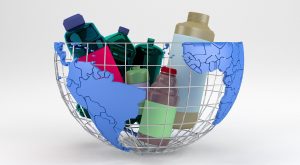One of the main tire manufacturers in the world, Continental, has ensured that, as of 2022, they will start using reprocessed polyester obtained from recycled plastic bottles to produce carcasses for its tires. The company has indicated that they will obtain this material from polyethylene terephthalate (PET) bottles through a mechanical process, and that its properties already allow it to definitively replace conventional polyester. In addition, they have affirmed that, in collaboration with OTIZ, an entity specialized in fibers and textile manufacturer, that have developed their own technology to recycle PET bottles, so that the polyester meets the specific requirements of the tires produced.
These types of initiatives confirm the Golden Age that plastic recycling is experiencing and that contribute to solving the problem of the global volume of waste that is generated throughout the world. Even though it is a difficult material to manage as waste, there are companies that, thanks to a constant commitment to innovation, are managing to find ways to manage and reuse it. Repetco, for example, offers its own patented system, which is respectful with nature, through PET/PE multilayer food packaging of post-consumer origin. Through a unique process, rPET pellets and rPE are generated that can be used again in the food industry with trays and containers made of multilayer PET/PE sheets; in bottles for soft drinks or detergents; and in fibers for the textile and automobile industry.
Brand image
In general, PET is a material that is used quite frequently to make packaging, and which, in its reused version rPET, can also be used for making fabrics. Through a food container it is possible to manufacture T-shirts, rags, a backpack or covers for bicycle saddles, for example. In addition to supplying a new life for many plastic waste, especially related to the food industry, the development of this technology favors sustainability and the protection of ecosystems.
For this reason, this series of positive elements is permeating many companies that, with increasing frequency, resort to corporate gifts made with rPET to communicate their corporate values to their stakeholders.
rPET is increasingly used in corporate gifts to convey a good image of companies
New industrial solutions
The development of innovations on the recycling of PET containers does not stop growing, which is a symptom of the important expectations that are placed on this sector for the coming years. For example, significant advances are taking place in the manufacture of foils and blister packaging, with thicknesses of 120 µm (the minimum until now was 150 µm), which are being essential to improve the precision of the rollers used in many mechanized industries. In addition, the use of lower thicknesses, in the long term, favors greater energy savings by factories.
Another segment in which a lot is being invested is in improving the sealing of containers, progressively eliminating the need to use conventional laminates in favor of more economical and efficient materials. In this way, companies that produce refrigerated food will improve the quality of their products, while the consumer will opt for fresher and safer food.
In the liquid segment, improved sealing will make personal care or cleaning products less permeable to breakage, increasing their useful life at home and significantly reducing the possibility of any domestic accident. In the case of beverages, there are more and more prototypes of lighter containers with a lower cost per unit for the manufacturer.
Focusing on fabrics, innovation in rPET is favoring the development of more resistant materials, both in relation to weight and the maintenance of their properties over time, so that in the coming years more and more industries will bet on this type of material for the transport and storage of large tonnage loads.
Other news of interest: What real benefits does PET plastic recycling have for the economy







